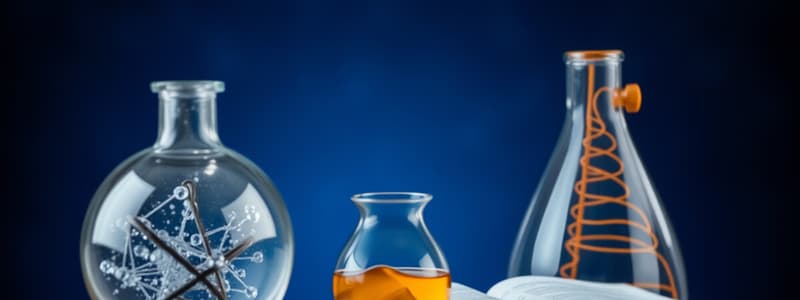Podcast
Questions and Answers
What does empirical investigation mean?
What does empirical investigation mean?
It is based on careful measurements and direct observation.
What is a theory in science?
What is a theory in science?
It is a testable explanation for a set of observations.
What is the difference between a theory and a hypothesis?
What is the difference between a theory and a hypothesis?
A hypothesis is often a specific prediction related to a larger theory.
What must a hypothesis be?
What must a hypothesis be?
What is the operational definition of driving ability as used by Jenna?
What is the operational definition of driving ability as used by Jenna?
In Jenna's study, what is the independent variable?
In Jenna's study, what is the independent variable?
The independent variable ________, whereas the dependent variable ________.
The independent variable ________, whereas the dependent variable ________.
What does randomization do?
What does randomization do?
What is the dependent variable in Gina's hiring discrimination study?
What is the dependent variable in Gina's hiring discrimination study?
The test scores represent the ________ in this experiment.
The test scores represent the ________ in this experiment.
What level must experiment results reach to ensure they are likely due to the independent variable?
What level must experiment results reach to ensure they are likely due to the independent variable?
What does it mean if results rise to the level of statistical significance?
What does it mean if results rise to the level of statistical significance?
Measurements that use numbers to show levels, size, intensity, or amounts of a variable are said to be?
Measurements that use numbers to show levels, size, intensity, or amounts of a variable are said to be?
This would represent ________ of the original research study.
This would represent ________ of the original research study.
What do researchers design experiments to determine?
What do researchers design experiments to determine?
What would NOT be controlled to prevent extraneous variables from influencing the experiment outcome?
What would NOT be controlled to prevent extraneous variables from influencing the experiment outcome?
What does random assignment mean?
What does random assignment mean?
A participant who is exposed to the special treatment is said to be in the ________ condition.
A participant who is exposed to the special treatment is said to be in the ________ condition.
What could a correlational study on attendance and GPA potentially conclude all of the following EXCEPT?
What could a correlational study on attendance and GPA potentially conclude all of the following EXCEPT?
If a study finds a negative correlation between exercise and blood pressure, what does this indicate?
If a study finds a negative correlation between exercise and blood pressure, what does this indicate?
Which of the following would be considered a true experiment?
Which of the following would be considered a true experiment?
What is expectancy bias?
What is expectancy bias?
What will reduce the likelihood of confounding variables EXCEPT?
What will reduce the likelihood of confounding variables EXCEPT?
In Dr. Suttman's study, what could be a confounding variable EXCEPT?
In Dr. Suttman's study, what could be a confounding variable EXCEPT?
What is the purpose of an Institutional Review Board (IRB)?
What is the purpose of an Institutional Review Board (IRB)?
What must research participants be informed of according to the APA guidelines?
What must research participants be informed of according to the APA guidelines?
What is the purpose of using a frequency distribution?
What is the purpose of using a frequency distribution?
Which measure of central tendency is most affected by extreme scores?
Which measure of central tendency is most affected by extreme scores?
If data has low variability, what does this indicate?
If data has low variability, what does this indicate?
What does the standard deviation represent in a set of data?
What does the standard deviation represent in a set of data?
In a normal distribution, what percentage of scores fall within one standard deviation from the mean?
In a normal distribution, what percentage of scores fall within one standard deviation from the mean?
What does a large p value (such as p>.50) indicate about study results?
What does a large p value (such as p>.50) indicate about study results?
Why is it impossible to ever have a p=.00?
Why is it impossible to ever have a p=.00?
What is the correct order for presenting information in an academic psychological article?
What is the correct order for presenting information in an academic psychological article?
What should researchers use for results to be generalizable in a study of impulse buying?
What should researchers use for results to be generalizable in a study of impulse buying?
What is an advantage of using the median when examining a set of data?
What is an advantage of using the median when examining a set of data?
Flashcards are hidden until you start studying
Study Notes
Empirical Investigation
- Empirical investigation relies on careful measurements and direct observation for research validity.
Scientific Theory
- A theory is defined as a testable explanation for a range of observations.
Theory vs. Hypothesis
- A hypothesis is a specific prediction derived from a broader theory.
Characteristics of a Hypothesis
- Must be testable and falsifiable, enabling researchers to determine its validity.
Operational Definitions
- Driving ability in Jenna's study is quantified by the number of automobile accidents.
Independent Variable
- The gender of participants (male or female) serves as the independent variable in Jenna's study.
Variable Relationships
- The independent variable is manipulated by the researcher; the dependent variable is the outcome measured.
Randomization
- Randomization is a technique that helps minimize experimenter bias in research.
Dependent Variable in Hiring Study
- In Gina's discrimination study, the dependent variable is the interviewers' responses to candidates based on attractiveness.
Test Scores as Dependent Variable
- In the study on study time and test results, the test scores represent the dependent variable.
Statistical Significance
- The results must significantly differ from chance to support the independent variable's effect.
Manipulation Confirmation
- A statistically significant result indicates that the manipulation of the independent variable likely caused the observed effects.
Quantified Measurements
- Measurements that utilize numbers to reflect levels, sizes, or quantities of a variable are termed quantified.
Replication
- A skeptic can replicate an original study to validate or challenge its findings.
Purpose of Experiments
- Experiments aim to ascertain whether changes in the independent variable cause changes in the dependent variable.
Control Groups
- Control groups must not inadvertently include participants who are more tired, as this introduces extraneous variables.
Random Assignment
- Ensures all participants have an equal likelihood of being assigned to control or experimental groups.
Experimental Condition
- Participants receiving special treatment are categorized within the experimental condition.
Correlational Study Limitations
- Correlational studies cannot definitively assert causation, such as "attending school leads to higher grades."
Negative Correlation
- A negative correlation between exercise and blood pressure suggests that increased exercise is associated with lower blood pressure.
True Experiments
- True experimental designs must closely adhere to rigorous scientific methodology.
Expectancy Bias
- This bias can lead researchers to interpret outcomes based on pre-existing assumptions about expected results.
Confounding Variables
- Disclosing group assignments to participants can potentially influence the experiment's outcome due to confounding variables.
Identifying Confounding Variables
- In Dr. Suttman's study, the end blood pressure measurement is not a confounding variable.
Institutional Review Board (IRB)
- The IRB's role is to ensure that research adheres to ethical standards.
APA Participant Guidelines
- Participants must receive debriefing post-study if deception was involved in the research process.
Frequency Distribution Purpose
- A frequency distribution organizes raw data for clarity and interpretability.
Central Tendency Affected by Extreme Scores
- The mean is highly susceptible to skewing by extreme values in a dataset.
Variability in Data
- Low variability indicates scores are closely packed around the mean.
Standard Deviation Representation
- Standard deviation conveys the average distance of scores from the mean.
Normal Distribution Scores
- Approximately 68% of scores fall within one standard deviation from the mean in a bell curve.
High P-value Implication
- A large p-value (>0.50) signifies a high likelihood that results may have occurred by chance.
Impossibility of p = 0
- A p-value of 0 is unattainable as all studies have a slight chance of yielding observed results by random chance.
Order of Information in Academic Articles
- Academic psychological articles typically follow this structure: abstract, introduction, methods, results, discussion, references.
Generalizability in Research
- Using a representative sample is crucial for generalizing findings from a study on consumer behavior.
Advantage of Median
- The median effectively mitigates the influence of extreme scores, providing a better reflection of the data compared to the mean.
Studying That Suits You
Use AI to generate personalized quizzes and flashcards to suit your learning preferences.




